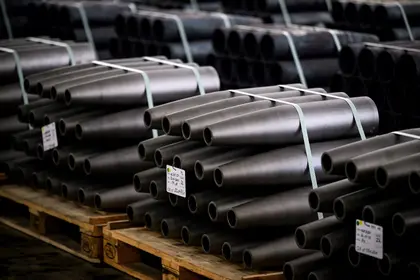Russian enterprises are now producing artillery shells three times faster and at a quarter of the cost compared to the United States and European Union countries, Sky News reports, citing Bain Consulting Company analysis.
Despite Ukraine's Western allies' larger combined economies, they are currently lagging behind Russia in shell production rates.
JOIN US ON TELEGRAM
Follow our coverage of the war on the @Kyivpost_official.
Bain forecasts indicate that in 2024, Russia will produce approximately 4.5 million artillery shells, whereas the EU and the USA together will produce around 1.3 million.
Additionally, Russian 152-millimeter shells are significantly cheaper to produce than the Western 155-millimeter versions.
The disparity in shell production has not gone unnoticed by Ukrainian military personnel.
Russian forces are able to fire five shells for every one fired by Ukraine, a situation that has forced Ukrainian troops to become more efficient in their targeting, using fewer shells to achieve their objectives.
The Armed Forces of Ukraine (AFU) first ran short of artillery ammunition in April 2022 and since then has suffered chronic shell shortages.
By late 2023 the shortages were crippling and by most accounts, Russian guns were outshooting Ukrainian by five to one
Ukrainian gunners for the first time in months appear to have had enough artillery shells to take on big Russian ground attacks, but supplies are still limited and long-promised Western ammunition deliveries are only just starting to show up at the front.

1,100 North Korean Casualties in Russia-Ukraine War: Seoul
Russian armored columns attacking during May struck Ukrainian defenses supported by gunners with shells available to shoot back – as had widely not been the case for some time – on battlefields across the front, a Kyiv Post review of open-source combat data found.
Ukrainian artillerymen in the Kharkiv, Donbas and Zaporizhzhia sectors appeared to be dropping shell concentrations onto Russian tanks and armored personnel vehicles as attack columns drove into mine fields or constricted locations, battlefield accounts from both sides of the fighting.
Massive bombardments lasting hours, a preferred Russian tactic since invading Ukraine in February 2022, were not visibly attempted by Ukrainian forces during the recent attacks.
You can also highlight the text and press Ctrl + Enter






